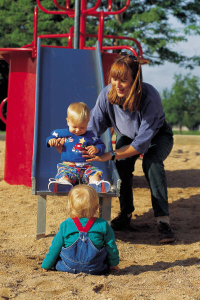When I was younger with small children,  my husband occasionally came home from work to me bombarding him with talk. Once he said to me, “Talk to adults much?” and laughed.
my husband occasionally came home from work to me bombarding him with talk. Once he said to me, “Talk to adults much?” and laughed.
I said, “No! And that’s the problem.”
I was not amused.
My husband learned that there were times I needed to unload. And he needed to listen and not tell me how to fix it.
Everyone says that children grow up too soon. And it’s true. You turn around and they’re gone. Not gone to the ends of the earth (usually) but irrevocably gone to jobs and homes and families of their own. Then, according to surveys we fill out about who lives in our home, we are childless.
“Empty nest” is one of the few completely descriptive terms in the English language. If the home you raised your children in was the right kind of home, it was like a nest: a place of provision and protection. The children were sheltered under your wings and kept secure until they were old enough to move on. Human mothers often resist this phase, but in nature not so much. The mother eagle sometimes pushes the eaglets out of the nest to teach them to fly. They learn quickly as they’re falling. And she swoops under them and catches them if they’re slow learners.
Whether our eaglets fall, glide, or soar out of our nests, eventually our nests become “empty.” That too is descriptive: not just of the amount of unoccupied space in our homes but of the feeling we can have: the empty feeling that our family is gone. Unfortunately, we sometimes translate that feeling into the idea that our usefulness is gone. The freedom that many women think they will enjoy with an empty nest isn’t realized because they are too wrapped up in what used to be to enjoy what currently is.
If that feeling is indulged, instead of enjoying the freedom to do new things, a woman finds she doesn’t know what to do. Some make a serious mistake at this point by infringing on their children’s freedom with too many phone calls, letters, unsolicited advice or visits.
From ancient times up until the early part of the 20th century, women had many children. Because people had shorter life spans, often before the youngest child was raised to adulthood, the mother (by then in her 50s) died. Gradually family size became much smaller, and childrearing was finished earlier, often in a woman’s 40s. At the same time life spans increased: women began living into their 70s.
Women were faced with a question: What will you do with the next approximately 30 years of life when you are no longer raising a family?
Those who have the most problems with their empty nests are often those who weren’t prepared to face those years. They considered their occupation and calling to be a stay-at-home mother. Then their job grew up and left them. It was an empty nest indeed!
When this happens, women often feel as unemployed as if they’d received a pink slip from a corporation. Only worse! People can go out and get another job. Rarely do women decide to or are physically able to start having more babies to replenish their family.
So I’ll ask you the question I asked myself many years ago: what do you want to be (not when you grow up but) when your kids grow up? I’m not urging you to have a second career plan to fall back on; I’m urging you to think about how to wisely fill the years the Lord gives you after your childrearing duties are over.
Having an empty nest returns you to the identity you had B.C. (before children). You are more than just your husband’s wife and your children’s mother. You are your heavenly Father’s daughter, and that doesn’t change. He has plans for you even in the later years of your life. His will for you might include a career in the workplace or in a ministry or increased volunteer work in your church. It could mean honing a creative skill or talent you only dabbled at before. But it should also include growing closer to God and becoming a mature example of His grace.
Moses lived to be 120, but the last 40 years (the last third of his lifetime) were the productive years. During those years he followed God and led the children of Israel (often wayward children) out of bondage in Egypt. A line in one of the two psalms he wrote could also be the prayer of every woman who faces a changing life season. In Psalm 90:12 (NIV), Moses prayed: “Teach us to number our days aright, that we may gain a heart of wisdom.”
My prayer for all whose nests are empty is that your hearts may be full — full of godly wisdom.
About Vicki Huffman
National award-winning journalist Vicki Huffman's latest book is Soon to Come: The Revelation of Jesus Christ. It is a verse by verse exposition of the only purely prophetical book in the New Testament. Her other five books are: The Jesus Moses Knew: How to See Christ in the Old Testament; A Secret Hope (novel); Still Looking: Finding the Peace of God in Job Loss; Plus Living: Looking for Joy in All the Right Places, and The Best of Times. All are available in print and e-book on amazon.com. Vicki is a national award-winning author who has taught the Bible for many years. She was an editor for several Christian publishing houses, including Thomas Nelson and David C. Cook Ministries.
- Web |
- More Posts(120)



